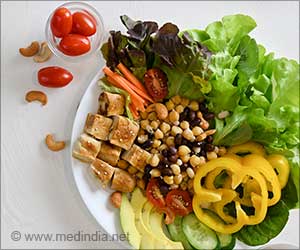New study highlights the recommended dietary patterns and support strategies for individuals with hypertension, prediabetes or type 2 diabetes, and obesity.

‘Very low carbohydrate diet might be more beneficial for the management of lifestyle diseases than the Dietary Approaches to Stop Hypertension (DASH).’





These conditions can trigger stroke, end-stage renal disease, myocardial infarction, and premature death. While first-line treatment for these individuals should be a diet and lifestyle intervention, experts disagree about which diet should be recommended (1✔ ✔Trusted Source2013 AHA/ACC Guideline on Lifestyle Management to Reduce Cardiovascular Risk: A Report of the American College of Cardiology/American Heart Association Task Force on Practice Guidelines
Go to source).
Effect of DASH Dietary Patterns and Very Low Carbohydrate Diets on Metabolic Outcomes
The Dietary Approaches to Stop Hypertension (DASH) dietary pattern is rich in fruits, vegetables, whole grains, and low-fat dairy foods, restricts saturated and total fat, and is lower in sodium. A DASH diet is the standard-of-care dietary recommendation for blood pressure (BP) control by the American Heart Association (2✔ ✔Trusted SourceComparing Very Low-Carbohydrate vs DASH Diets for Overweight or Obese Adults With Hypertension and Prediabetes or Type 2 Diabetes: A Randomized Trial
Go to source).
Another promising diet is a very low-carbohydrate (VLC) diet, also known as a ketogenic or “keto” dietary pattern, which is a very low-carbohydrate, moderate protein, higher-fat diet. A VLC diet has been found to decrease blood pressure and it is recommended as an option for glycemic control and weight loss by the American Diabetes Association.
No studies to date have directly compared a DASH vs VLC diet for efficacy in improving measures of hypertension, diabetes, and weight loss in this population.
Researchers randomized 94 adults with the aforementioned conditions, using a 2 x 2 diet-by-support factorial design, comparing a very low-carbohydrate (VLC) or ketogenic diet versus a Dietary Approaches to Stop Hypertension (DASH) diet.
Additionally, they compared results with and without extra support activities, such as mindful eating, positive emotion regulation, social support, and cooking education.
Advertisement
Behavioral Counseling Interventions to Promote a Healthy Diet and Physical Activity for Cardiovascular Disease Prevention in Adults With Cardiovascular Risk FactorsUS Preventive Services Task Force Recommendation Statement
Go to source). The addition of extra support did not have a statistically significant effect on outcomes.
For adults with hypertension, prediabetes, or type 2 diabetes, and who are overweight or obese, a VLC diet demonstrated greater improvements in systolic blood pressure, glycemic control, and weight over four months compared to a DASH diet.
Advertisement
These results provide initial evidence that a VLC dietary pattern might be more appropriate than the DASH dietary pattern for short-term disease management for these high-risk adults and thus might have implications for clinical practice guidelines. Future research with larger samples, longer follow-up periods, and long-term outcomes is warranted.
References:
- 2013 AHA/ACC Guideline on Lifestyle Management to Reduce Cardiovascular Risk: A Report of the American College of Cardiology/American Heart Association Task Force on Practice Guidelines - (https://www.ahajournals.org/doi/full/10.1161/01.cir.0000437740.48606.d1 )
- Comparing Very Low-Carbohydrate vs DASH Diets for Overweight or Obese Adults With Hypertension and Prediabetes or Type 2 Diabetes: A Randomized Trial - (https://www.annfammed.org/content/21/3/256)
- Behavioral Counseling Interventions to Promote a Healthy Diet and Physical Activity for Cardiovascular Disease Prevention in Adults With Cardiovascular Risk FactorsUS Preventive Services Task Force Recommendation Statement - (https://jamanetwork.com/journals/jama/article-abstract/2773280 )















